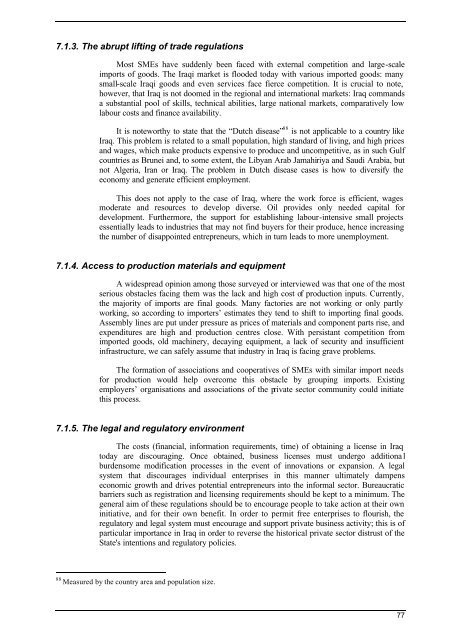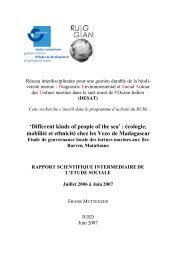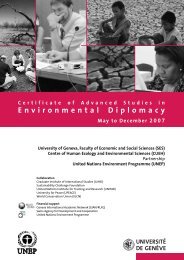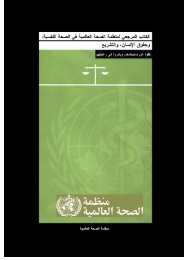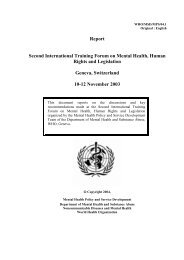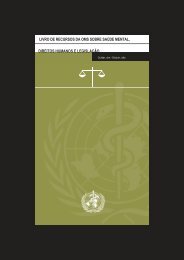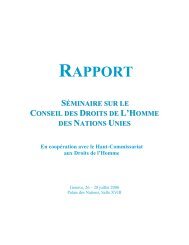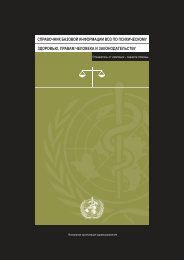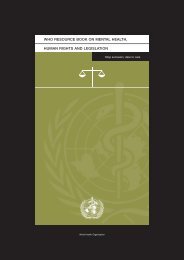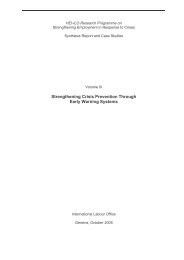Volume 1 Cedric - revised luca Final - RUIG-GIAN
Volume 1 Cedric - revised luca Final - RUIG-GIAN
Volume 1 Cedric - revised luca Final - RUIG-GIAN
Create successful ePaper yourself
Turn your PDF publications into a flip-book with our unique Google optimized e-Paper software.
7.1.3. The abrupt lifting of trade regulationsMost SMEs have suddenly been faced with external competition and large-scaleimports of goods. The Iraqi market is flooded today with various imported goods: manysmall-scale Iraqi goods and even services face fierce competition. It is crucial to note,however, that Iraq is not doomed in the regional and international markets: Iraq commandsa substantial pool of skills, technical abilities, large national markets, comparatively lowlabour costs and finance availability.It is noteworthy to state that the “Dutch disease” 88 is not applicable to a country likeIraq. This problem is related to a small population, high standard of living, and high pricesand wages, which make products expensive to produce and uncompetitive, as in such Gulfcountries as Brunei and, to some extent, the Libyan Arab Jamahiriya and Saudi Arabia, butnot Algeria, Iran or Iraq. The problem in Dutch disease cases is how to diversify theeconomy and generate efficient employment.This does not apply to the case of Iraq, where the work force is efficient, wagesmoderate and resources to develop diverse. Oil provides only needed capital fordevelopment. Furthermore, the support for establishing labour-intensive small projectsessentially leads to industries that may not find buyers for their produce, hence increasingthe number of disappointed entrepreneurs, which in turn leads to more unemployment.7.1.4. Access to production materials and equipmentA widespread opinion among those surveyed or interviewed was that one of the mostserious obstacles facing them was the lack and high cost of production inputs. Currently,the majority of imports are final goods. Many factories are not working or only partlyworking, so according to importers’ estimates they tend to shift to importing final goods.Assembly lines are put under pressure as prices of materials and component parts rise, andexpenditures are high and production centres close. With persistant competition fromimported goods, old machinery, decaying equipment, a lack of security and insufficientinfrastructure, we can safely assume that industry in Iraq is facing grave problems.The formation of associations and cooperatives of SMEs with similar import needsfor production would help overcome this obstacle by grouping imports. Existingemployers’ organisations and associations of the private sector community could initiatethis process.7.1.5. The legal and regulatory environmentThe costs (financial, information requirements, time) of obtaining a license in Iraqtoday are discouraging. Once obtained, business licenses must undergo additiona lburdensome modification processes in the event of innovations or expansion. A legalsystem that discourages individual enterprises in this manner ultimately dampenseconomic growth and drives potential entrepreneurs into the informal sector. Bureaucraticbarriers such as registration and licensing requirements should be kept to a minimum. Thegeneral aim of these regulations should be to encourage people to take action at their owninitiative, and for their own benefit. In order to permit free enterprises to flourish, theregulatory and legal system must encourage and support private business activity; this is ofparticular importance in Iraq in order to reverse the historical private sector distrust of theState's intentions and regulatory policies.88 Measured by the country area and population size.77


